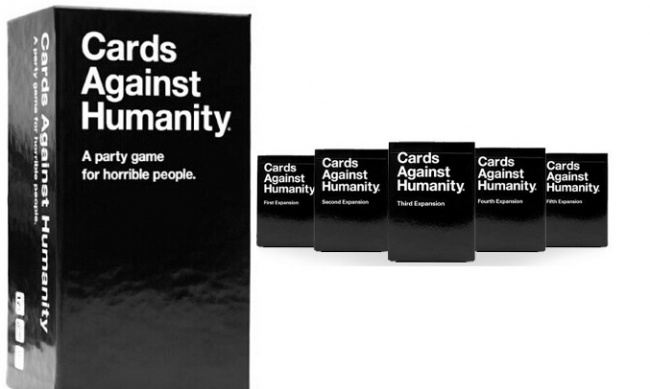This list is compiled from all game items we sell (1500+ titles) that are NOT collectible in nature. This does not include any collectible items – no Magic, Pokemon, HeroClix or D&D figures. It includes all non-collectible card games, all board games.
These are the 10 most sold items in my store that are game items. Games. Any kind.
This list may shock some folks.
#1. Cards Against Humanity Core Game
#2. Cards Against Humanity Expansion #1
#3. Cards Against Humanity Expansion #3
#4. Cards Against Humanity Expansion #2
#5. Crabs Adjust Humidity
#6. SuperFight
#7. SuperFight RED Expansion
#8. Cards Against Humanity Expansion #5
#9. Munchkin Core Game
#10. D&D 5th Edition Players Handbook
Of the items on this list, seven are not available from my distributors. So far this year, I have ordered from ACD, Alliance, Diamond, GTS, Lion Rampant, Mad Al, PHD, and Southern Hobby. And, of those distributors, absolutely none of them can supply me with Superfight or Cards Against Humanity.
I find this alarming. Seven of my top ten items cannot be sourced by me through wholesale distribution. Additionally, my store carries and sells eight other titles we consider significant to our bottom line, which we either buy direct or through Amazon as our only source – those titles are not available through any distributor I know of.
The game industry exists in a way that not all retail industries do. Here are a few “rules” which, really, are more like “general truths.” This is the retail buying environment I deal with today:
- Most game stores are independently owned.
- Most game store owners own one store.
- Most game stores order a great majority of their products through distribution.
- Distributors act as gathering houses, which bring in a variety of products so retailers do not have to order through 50, 100 or more publishers.
- Most distributors have 80% or so overlap with other distributors on what they carry.
- Most products that do not overlap are not important enough to retailers to really chase.
- A few “exclusives” exist, which cause most retailers to have an account with the one distributor who has the most significant exclusives.
In this environment, retailers do not have an organization that gives them leverage in the marketplace.
In this environment, a single distributor has a more significant position than others, due to exclusives.
In this environment, most retailers order from two or more distributors. I believe most retailers order from three or more, I don't know any who do not. But, that is not evidence, just supposition.
And, in this environment the clear advantage of using distribution is ease of product acquisition. I call Tamara Cook at ACD Distribution on Tuesday (usually, she calls me, she is really on the ball that way), and I place an order. Tamara, who is an outstanding rep, knows and keeps track of various things for me (and, I presume, for all her accounts). She knows I want a base quantity of every POP Vinyl Figure that comes out. She will check to see if I need any re-stocks for that line. She knows I want two of every Paizo hardcover book, one of every map and softcover book and module. She knows I do not carry Paizo novels (we sell used books, and carrying new books alongside them is clumsy). Tamara knows I want X on new Yu-Gi-Oh! releases, and X2 on new Pokemon releases, and she tells me every time they have a resupply of Reaper Bones come in, because Tamara knows it is my most positive cash flow line of miniatures. Tamara will mention every title by FFG, and often helps me select merchandise I had decided not to carry. She keeps track of things I order that were not available, and mentions them to me when they do come in. I carry Iello due to her recommendation. I carry Asmodee purely due to her mentioning to me how well it sells for her other accounts.
Yet, I cannot source seven of my top ten best moving titles from her. I also cannot get eight other significant titles (they are all in my top 25) from her. That is 15 of my top 25 items. Because the industry is changing, as it has always changed, but this change is in a different direction.
You see, Kickstarter, true Kickstarter companies, those that would not have had the cash to get into this business, in many instances, who have been crowd-funded, those companies have skipped both the distributors AND the retailers – and their products are available either entirely, or primarily, direct to consumer.
NOTE: This is the right of those companies. You design it, you make it, it is yours. I have absolutely no “right” to your product whatsoever! But, in many instances, I do have a desire to carry your product.
As a store owner, this is an issue for me. I am going to acquire those products if I can, by whatever means I can, and sell them to the throngs of people who visit my store each year. I mean, last year, we had 64,813 customers in my store. In a town of 8,000 people. We sold a lot of Cards Against Humanity, Superfight, Paperback and other games that we cannot get from distribution – right alongside the Settlers of Catan, Comuni, Munchkin and Dominion. So, having to chase down those titles I would rather get from distribution sucks. It causes me to expend time and effort, when it would be easier to just let this source out to Tamara Cook.
Is that a “big” problem? No.
Or, more accurately, not yet. However: I wonder if distributors understand where that is headed?
See, currently I buy 27 different game titles from six different companies. And I get them all from this new wholesale resource, Amazon.
No, not to confuse the issue. Amazon does not sell to me at a better price than they sell to you at. However, as is the case most often: I can buy items on Amazon and mark them up and sell them in my store at a profit. I am pretty sure just about >now< someone will scream about price gouging.
Those people usually show up, with their limited math skills, and lack of business acumen, and prattle on about this topic for a bit. I don't mind. I can't be charged with educating those willfully ignorant of business knowledge that my father imparted on me when I was eight years old. “Jimmy,” he said, which was odd, since my name is not Jimmy. “Jimmy, you can't sell your silver dime to the coin dealer for the same price he sells it for, because he has to make a profit, to keep the lights on.” (That is all the formal business training I ever received, come to think of it).
Anyway, buying from one source, marking it up, and reselling it to another buyer is the entirety of retail. In this case I am buying Cards Against Humanity from Amazon and reselling it, primarily to people who do not have Internet access or a credit card to pay with. I also buy Harry Potter wands, various non-distributed games, Dragon Ball Z balls, Spider-Man hats, and, quite often, other game products. Often, I can buy a Risk game at a price that is better than I could buy the exact same game from my distributors for. Other things, as well. Like SURGE Cola.
So, in this manner: Amazon acts as a distributor for me. Add in my PRIME Amazon account, and I get free shipping on the great majority of what I buy. Including jewelry, boxed games, DVD sets, video games, graphic novels, posters, wall scrolls, T-shirts, swords, used games, action figures and a ton more. About now you are likely asking yourself if my column turned into an ad for Amazon.
Certainly not.
As always, my goals are to help fellow retailers succeed – and help gamers understand the business side of their local game stores.
And, in this one instance, I am actually asking distributors for their assistance. Please, source more games for us. Cards Against Humanity could really just be a $40 game, and sold to retailers at $25 a copy. Can't a distributor out there get this product? Even a hobby market exclusive version? Which would be more expensive? Maybe have the first expansion in the box, and come at a $50 MSRP?
Get other popular games into the market for retailers. And, stem the tide of great games going direct to consumer. This is not only doing your retailers a big favor, it is in your companies’ best interest too, my distribution partners.
I want more games and hobby products available through my distribution partners. And, wondering why the only distributor to have their buyer call me in the past 2 years was Mad Al, in Anchorage, Alaska. I can point you toward a lot of top tier products we source from Amazon that I would rather get from YOUR distribution company.
Readers, if you enjoyed my little musings here, please friend me on Facebook:
https://www.facebook.com/marcus.king.18
The opinions expressed in this column are solely those of the writer, and do not necessarily reflect the views of the editorial staff of ICv2.com.




